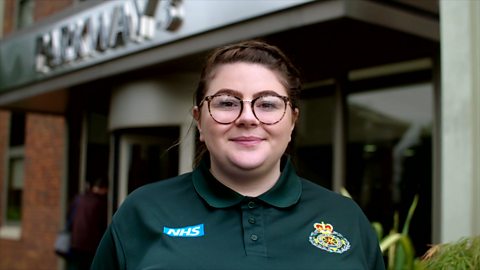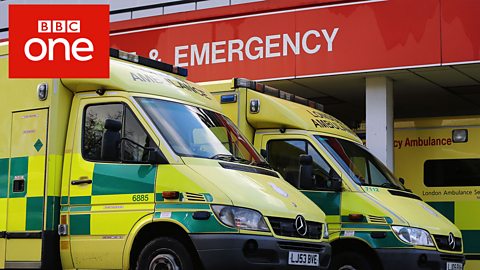Meet Hannah and learn more about life as a Hazardous Area Response Team paramedic, attending call-outs where patients are difficult to reach. Part of our Bitesize world of work series.
Hannah:I'm Hannah, I'm 29 and I'm a HART paramedic. HART stands for Hazardous Area Response Team. The HART team was set up afterthe London bombing. They developed a team of paramedics that could be trained up and attend these incidents. Somebody may ask for the HART team because they are unable to access the casualty. Patients who possibly may be stuck at heights, in water, fire incidents. We have the knowledge to treat in that area.
Call taker:Someone’s screaming very loud for help. It appears to be coming from the general area of this gas holder. So the HART team have run in.
Hannah:Once we are in the scene, we are allowed to get access if the casualty cannot come out. As HART paramedics, we treat patientsbut we don't transport. We would be the ones that would have the kit to get to the patient. This is our breathing apparatus to go intofires. MTFA bags, so this is for the terrorist incidents. We've got our SWAH bags – Safe Working at Heights. The hazardous area jobs can get really challenging, really tough, but I absolutely love pushing myself, putting myself in those situations.
Hannah's colleague:Hannah's calm, cool, collected and most importantly… say when she gets there and she's dealing with the patient, she's fantastic.
Hannah:You've got to keep physically fit within this role, because your health is number one. There's a lot of lifting, shifting equipment, patients about.
To be a paramedic, you have to attend university to become a paramedic initially. I did Applied Science, which then led me on to go to university and do Paramedic Practice. Getting where I am today, definitely not a smooth ride, going to university, the academic side of things, pretty tough for me, but I did it and I got through.
I've always wanted to be a paramedic. I love helping people. I've always been a caring person. If someone was thinking about applying for a HART paramedic, I would absolutely tell them, jump at it, put your all into it and hopefully see you on the team.
The hazardous area jobs can get really challenging but I absolutely love pushing myself.
- Hannah's job involves attending to patients in difficult-to-reach places, such as when they are at heights, or stuck in water. HART paramedics treat patients but don't transport them back to hospital
- She says the job is like a cross between being a paramedic and a firefighter so she needs to be very physically fit for the role
- Hannah studied Paramedic Practice at university to become a paramedic. After three years on the job, she applied to be a HART paramedic, which took an extra two months of intense training
- She loves the challenge of her job, as well as the opportunity to help people.

Before becoming a HART paramedic like Hannah, you'll need several years' experience on the road as a paramedic. For more information about the opportunities for experienced paramedics to develop into more senior roles, check out NHS Health Careers.
What to expect if you want to become a paramedic
Paramedic average salary: NHS band 5-6. Read more about NHS bands. Salaries will differ in private healthcare.
Paramedic typical working hours: 36 to 38 hours per week. You work shifts, which could include evenings, weekends and bank holidays.
What qualifications do you need to be a paramedic?
You can get into this role via a university course, an apprenticeship, working towards the role or applying for a trainee scheme.
Source: LMI for All, National Careers Service, NHS Health Careers
This information is a guide and is constantly changing. Please check the National Careers Service website and the NHS Health Careers website for more information about working as a paramedic for the latest information and all the qualifications needed.
For careers advice in all parts of the UK visit: National Careers Service (England), nidirect (Northern Ireland), My World of Work (Scotland) and Careers Wales (Wales).

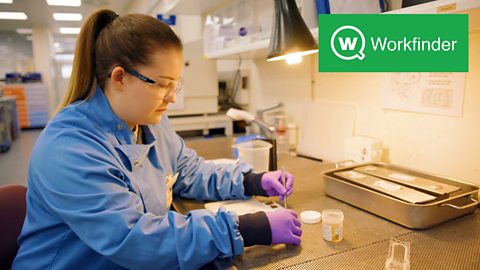
Work experience in your area
Find work experience placements with Workfinder.
Tips and advice
Help with interviews, writing a CV and all things work experience related.


Sara: community paramedic. video
Sara's a community specialist paramedic.
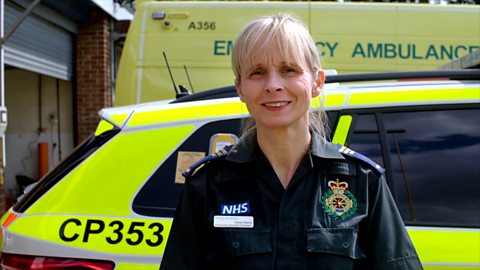
How to become a paramedic. collection
A collection of paramedic job profiles and information about what the role entails.
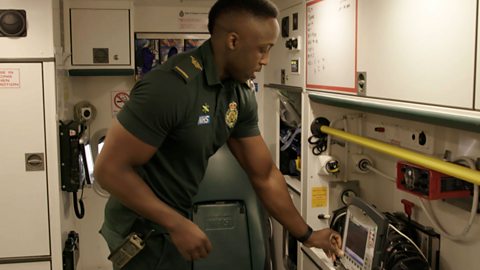
Emily: ambulance dispatcher video
Emily dispatches ambulances to 999 emergencies.
